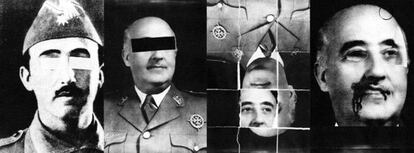The towns called Franco
Film on Caudillo's countryside communities sparks controversy at festival


Why in Germany, Italy and Portugal have the public traces of fascism been erased out of respect but not in Spain? Why in this country, unlike in Argentina and Chile, have the crimes committed under the dictatorship gone unpunished? Why does its historical memory remain weighed down by the propaganda of the victors? And why, in a place in La Mancha, is there a town called Llanos del Caudillo? Does this not shock anyone?
These are just some of the questions tackled in the documentary Los colonos del caudillo (The Caudillo's colonists), which was presented at the Seminci Valladolid International Film Festival amid a whiff of controversy last week, after directors, German Dietmar Post and Spaniard Lucía Palacios, denounced an attempt to censor the film by one of its interviewees, whose identity they chose not to reveal.
It is in that place in La Mancha, which lies on the flat landscape (llanos) that leads to Ciudad Real, that this investigation into the birth and fate of one of the 300 colonies constructed at the dawn of Francoism begins. The colonies were Francoist utopias created in the shadow of Mussolini's Città nuove system. In them, says a quotation from the time, would be born "the new fascist man: the anti-urban and anti-working class man, devoted to the land, God-fearing and dedicated to the regime, to which he owes everything, home, land and work, under the control of the party."
Anyone who sees the film will agree that it is respectful toward its contributors"
The film features testimonies from residents of Llanos del Caudillo, the children and grandchildren of the original inhabitants; the first Falangist mayor and the first teacher: the historians Isidro Sánchez and Esther Almarcha; engineer Carlos Delgado of the National Colonization Institute, and Cristóbal Gómez, an expert on Franco's colonies. But the two interviewees who carry the biggest historical weight are former Socialist Prime Minister Felipe González and ex-Francoist minister José Utrera Molina, father-in-law of current Justice Minister Alberto Ruiz-Gallardón and civil governor of the Ciudad Real provinces from 1956 to 1962.
According to the filmmakers, they received a letter from the lawyer's office of the son of an "important" figure in the film threatening to legally confiscate the work as the person had not been able to control the images depicted in it. The letter threatened to block the screening of the documentary because it damages and prejudices the figure's public image.
"We saw the film and we liked it, because of how it was put together, the subject and its general interest," notes Seminci programmer Denise O'Keeffe.
"It's a brave film, but there is no controversy," adds festival director Javier Angulo. "We have not received any message. So our position is completely sound."
"For us," says Dietmar Post, "it is more than a threat, it is an attack on freedom of expression and that is why we have issued a forceful response via our lawyer. Under no circumstances would we withdraw the film from the festival. It would mean going against what the rule of law and democracy represent.
"Anyone who sees the film - and the family of this man are invited to see it — will see that there is respect toward its contributors, as well as toward those who openly declare themselves Francoists. We are documentary makers; we have not manipulated any of the testimony. We interviewed him in 2008 for three hours, but the rest of the material — which is perhaps what now worries him so much - we are not going to use against him."
Tu suscripción se está usando en otro dispositivo
¿Quieres añadir otro usuario a tu suscripción?
Si continúas leyendo en este dispositivo, no se podrá leer en el otro.
FlechaTu suscripción se está usando en otro dispositivo y solo puedes acceder a EL PAÍS desde un dispositivo a la vez.
Si quieres compartir tu cuenta, cambia tu suscripción a la modalidad Premium, así podrás añadir otro usuario. Cada uno accederá con su propia cuenta de email, lo que os permitirá personalizar vuestra experiencia en EL PAÍS.
¿Tienes una suscripción de empresa? Accede aquí para contratar más cuentas.
En el caso de no saber quién está usando tu cuenta, te recomendamos cambiar tu contraseña aquí.
Si decides continuar compartiendo tu cuenta, este mensaje se mostrará en tu dispositivo y en el de la otra persona que está usando tu cuenta de forma indefinida, afectando a tu experiencia de lectura. Puedes consultar aquí los términos y condiciones de la suscripción digital.








































